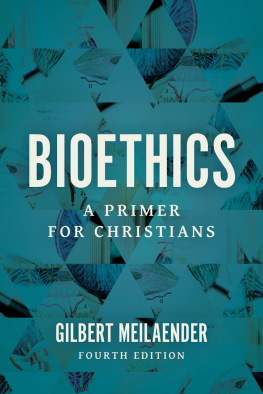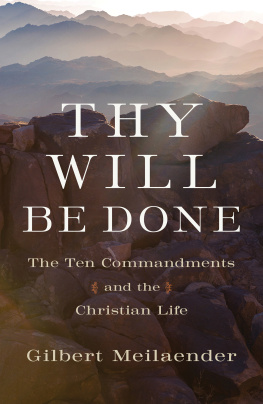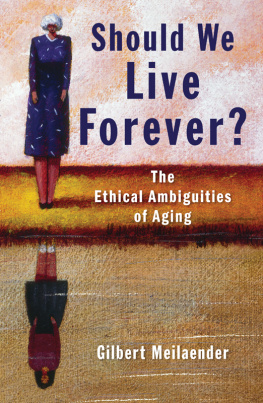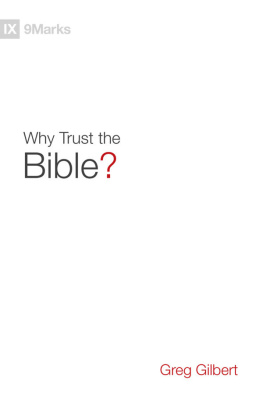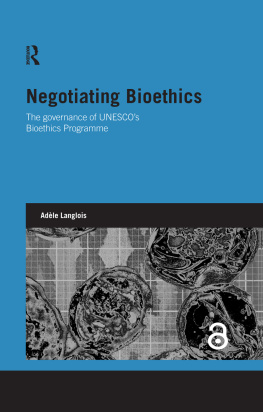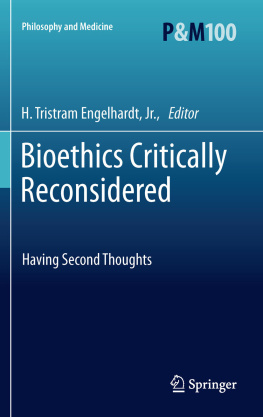Gilbert Meilaender - Bioethics: A Primer for Christians
Here you can read online Gilbert Meilaender - Bioethics: A Primer for Christians full text of the book (entire story) in english for free. Download pdf and epub, get meaning, cover and reviews about this ebook. year: 2020, publisher: Wm. B. Eerdmans Publishing Co., genre: Religion. Description of the work, (preface) as well as reviews are available. Best literature library LitArk.com created for fans of good reading and offers a wide selection of genres:
Romance novel
Science fiction
Adventure
Detective
Science
History
Home and family
Prose
Art
Politics
Computer
Non-fiction
Religion
Business
Children
Humor
Choose a favorite category and find really read worthwhile books. Enjoy immersion in the world of imagination, feel the emotions of the characters or learn something new for yourself, make an fascinating discovery.
- Book:Bioethics: A Primer for Christians
- Author:
- Publisher:Wm. B. Eerdmans Publishing Co.
- Genre:
- Year:2020
- Rating:3 / 5
- Favourites:Add to favourites
- Your mark:
- 60
- 1
- 2
- 3
- 4
- 5
Bioethics: A Primer for Christians: summary, description and annotation
We offer to read an annotation, description, summary or preface (depends on what the author of the book "Bioethics: A Primer for Christians" wrote himself). If you haven't found the necessary information about the book — write in the comments, we will try to find it.
Bioethics: A Primer for Christians — read online for free the complete book (whole text) full work
Below is the text of the book, divided by pages. System saving the place of the last page read, allows you to conveniently read the book "Bioethics: A Primer for Christians" online for free, without having to search again every time where you left off. Put a bookmark, and you can go to the page where you finished reading at any time.
Font size:
Interval:
Bookmark:

BIOETHICS
A Primer for Christians
FOURTH EDITION
Gilbert Meilaender
WILLIAM B. EERDMANS PUBLISHING COMPANY
GRAND RAPIDS, MICHIGAN
Wm. B. Eerdmans Publishing Co.
4035 Park East Court SE, Grand Rapids, Michigan 49546
www.eerdmans.com
2013, 2020 Gilbert Meilaender
All rights reserved
First edition 1996
Fourth edition 2020
262524232221201234567
ISBN 978-0-8028-7816-8
eISBN 978-1-4674-5991-4
Library of Congress Cataloging-in-Publication Data
Names: Meilaender, Gilbert, 1946 author.
Title: Bioethics : a primer for Christians / Gilbert Meilaender.
Description: Fourth edition. | Grand Rapids, Michigan : William B. Eerdmans Publishing Company 2020. | Includes bibliographical references and index. | Summary: The fourth edition of a compact textbook that addresses the most important issues in the field of bioethics from a Christian perspectiveProvided by publisher.
Identifiers: LCCN 2020002210 | ISBN 9780802878168 (paperback)
Subjects: LCSH: Medical ethicsReligious aspectsChristianity. | Christian ethics.
Classification: LCC R725.56 .M46 2020 | DDC 174.2dc23
LC record available at https://lccn.loc.gov/2020002210
Unless otherwise noted, Scripture quotations are from the Revised Standard Version of the Bible, copyright 1952 [2nd edition, 1971] by the Division of Christian Education of the National Council of the Churches of Christ in the United States of America. Used by permission. All rights reserved.
To Hannah
Only those who are
practicing the Tao
will understand it.
Contents
B ecause this primer continues to be read and used, it seems appropriate to bring it out in a fourth edition. I have brought the text up to date in quite a few places where that seemed to be needed; I have slightly increased the discussion of protecting physicians consciences in the practice of medicine; and I have noted the implications of recent advances in genetics (in particular, the CRISPR/Cas9 method of gene editing). Bioethical questions continue to be at the heart of many of our societys difficult moral problems. It is, therefore, importanteven necessarythat Christians try to think about these problems within a perspective that is shaped by the structure of Christian belief. But once again, as in earlier editions of this book, I emphasize that others are also welcome and invited to listen in.
I am pleased that Eerdmans has seen fit to publish a third edition of this little book and that it continues to find readers. Without making major changes or adding any entirely new chapters, I have updated and refined the text at any number of places. I have also added in chapter eight a brief discussion of the need to protect Christian conscience in the practice of medicine, an issue of increasing concern in our society. It remains true, as I said in the preface to the second edition, that this is a book written by a Christian chiefly for other Christians, but that all are welcome and invited to listen in.
T his book was first published slightly less than ten years ago, hardly a long time in world-historical terms. Yet, in the rapidly moving field of bioethicswhich, as a field, has been around for four decades at the mostten years is a long time indeed. For several years I have felt the need to update this primer, and this second edition is the result.
Here I simply summarize for those who may wish to know the principal changes I have made from the first edition. They are, I think, four. First, the whole of the text has been updated at various points in order to make the data given more current. This is not a book primarily about data or statistics; nevertheless, there were places where it seemed important to use more recent information, and I have done so. Second, at one pointin chapter threemy thinking has shifted somewhat, and I have altered the substance, or at least the tone, of the argument. In the first edition, without precisely committing myself to the view that a new individual human being comes into existence only after twinning has or has not occurred, I gave considerable weight to that possibility. I am now, for both empirical and metaphysical reasons, far less persuaded. Indeed, I think it likely that the argument that individuality is not established until approximately fourteen days of development is not going to stand the test of the embryological evidence and is likely to seem increasingly arbitrary. So I have revised the text at that point. Third, I have not only updated but also somewhat rewritten chapter nine (on organ donation). Although my position remains substantially unchanged, I think the tone of the argument is altered somewhat. Moreover, I have rewritten it in such a way as to take note (at least) of ongoing debates about the concept of brain deathan argument which I regard as still unfinished. Finally, I have added a new chapter in order to take up one special and highly controverted issue in research ethics: namely, research on embryos. With the possibility of the isolation of embryonic stem cells (involving destruction of embryos in the process), and with the looming possibility of cloning embryos for research purposes, this is an issue that has been of great importance in public debates. I did not think a general discussion of research ethics, without some special attention to this issue, was adequate.
The basic tone and tenor of the book remain unchanged. It is still true that this is a book written by a Christian chiefly for other Christians who want to think about some of the central issues in bioethicsthough, of course, as I say in the books introduction, others are welcome to listen in and consider how these issues look from the perspective of Christian vision.
T he pace of medical advance in our world is so rapid that we may easily forget just how recent is the growth of bioethics as a distinct area of concern. In the minds of our children organ donation and transplantation have become facts of life; yet the first successful kidney transplant took place in 1954 and the first heart transplant as recently as 1967. Our children may assume that a pregnant woman should have the health of her fetus screened in utero, should know before birth whether her child is male or female, and should consider abortion for any of a number of reasons; yet, amniocentesis was first performed in 1966, and the Roe v. Wade decision was handed down in 1973. We may assume that it is good for us to draw up advance directives about how we want to be treated if we become unconscious or otherwise incompetent, but the first living will law in this country (in the state of California) was passed in 1976. Many people simply assume that feeding tubes should be withdrawn from permanently unconscious patients; yet that step was not even seriously considered by the Quinlan family in 1976 when they went to court seeking to gain control over the medical care given their daughter Karen.
Something that might be called medical ethics has, of course, been present for a long time in the Western world. The Hippocratic Oath probably dates from the fourth century BC, and physicianseven in ages when they had none of the modern techniques for healingreflected on the demands of their calling. After World War II, because of the deep involvement of German physicians in the Nazi regimes program of human experimentation, eugenics, and genocide, the ethics of medicine received new attention. And, indeed, the Nuremberg Code that was formulated as a response to those abuses has today the status of international law.
Only, however, over the past half century at most has a discipline of bioethics developed, and only in these years have bioethical concerns become commonplace in our everyday lives. But as the concerns have become commonplace, they have also become the specialized possession of bioethicists, a development that may not be wholly salutary. There was a time when philosophers and theologians, in their respective ways, thought about the moral life, and physicians reflected upon the moral meaning of their practice. Then ethics developed as a specialized branch of philosophy or theology. Now we have bioethics, one branch of what is often called applied ethics. One of the things that happens in the course of this development is that bioethical reflection comes to focus more and more upon public policywhich in our society inevitably means a
Font size:
Interval:
Bookmark:
Similar books «Bioethics: A Primer for Christians»
Look at similar books to Bioethics: A Primer for Christians. We have selected literature similar in name and meaning in the hope of providing readers with more options to find new, interesting, not yet read works.
Discussion, reviews of the book Bioethics: A Primer for Christians and just readers' own opinions. Leave your comments, write what you think about the work, its meaning or the main characters. Specify what exactly you liked and what you didn't like, and why you think so.

